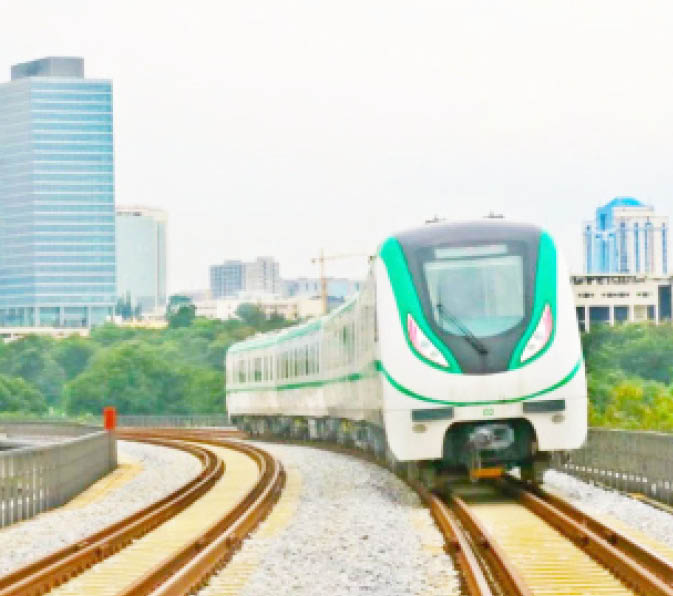The federal government made a provision of N44.4bn for the completion of the Abuja-Kaduna Railway project, Lagos-Ibadan and its associated additional works, among others.
This is contained in the 2025 Appropriation Bill presented to the National Assembly recently by President Bola Tinubu.
The allocation is N13bn higher than the budget of 2024, which was N33.1bn even as the allocation only covers some ancillary works on existing and active railway lines.
Daily Trust reports that major railway projects are being stalled across the country due to paucity of funds and the inability of the federal government to secure funding from financiers across the world.
- Rotary injects $2m into maternal, child healthcare in Nigeria
- Borno attack: Many soldiers missing as death toll rises
Among the projects include the Ibadan-Kano Standard Gauge Railway ($5.3bn); N11.17bn Lagos-Calabar coastal railway project; the $3.02bn rehabilitation project for the Eastern Line (Port Harcourt-Maiduguri) and the $1.9bn Kano-Maradi Railway project.
Former Managing Director of the Nigerian Railway Corporation (NRC), Engr. Fidet Okhiria disclosed in an interview that Tinubu secured the commitment of the Chinese government and financiers to the completion of the Lagos-Kano Standard Gauge as well as the Kano-Maradi rail line during his trip to China.
In an interview with TCAN Magazine, he said, “The good news is that we are going to complete Kaduna-Kano Rail that is ongoing as soon as possible and we are also trying to get enough funds to retake Ibadan to Abuja.
“Sooner or later, Ibadan-Osogbo will start. I know that has been confirmed, there is a fund for that one. We got approval from the Chinese. But the President didn’t talk about that, the president was emphasising on the Ibadan to Abuja. We know for sure about that.
“We have Abuja to Kano now, and Abuja can now link Ibadan and then from Abuja to Kano. Don’t forget there is also Kano-Maradi.
“On the visit, we were also able to check some of the rail materials they are going to use on the Kano-Maradi.
“There is a contract – Lagos to Kano, which is about $8.7bn or so. That is what they are still working on.”
While the funding is expected, the N41.48bn in the 2025 budget would also cover under projects including rehabilitation of the Itakpe – Ajaokuta Rail Line and Construction of 12 Nos Station Buildings and Track Laying works at Railway Ancillary Facilities Areas Agbor; Completion of Addendum 2A and Railway Ancillary Facilities Areas Agbor and Design, Manufacture, Supply and Installation of Rolling Stock, Supply of Spare Parts and Maintenance Equipment for the Ongoing Railway Modernisation Project.
Other projects listed to benefit from the allocation listed as ongoing under ERGP13177707 include Installation of Signal and Telecommunication System on Itakpe-Ajaokuta-Warri Railway Line; Installation of Acoustal Sensing Security Surveillance System for the Abuja (Idu)-Kaduna and Other Security Gadgets; Completion of Feasibility Studies for New Standard Gauge Rail Lines; Engagement of Transaction Advisors on Concession of the 1. Construction of Abuja-Baro-Itakpe and the Segment Aladja Warri Port and Kano-Maradi.
Also, the federal government made provision of another N1bn for new projects including Lekki – Ijebu Ode Rail & Coastal Rail Lekki – Apapa/Tin-Can; Badagry – Apapa/Tin-Can. The same amount was allocated for the project last year, which never took off.
Similarly, another N4bn was allocated for the provision of electrical power supply and water supply, the construction of protective fences along the railway corridors in Abraka, Ora, and Oruwhorum, for the Itakpe-Ajaokuta-Aladja Railway System.
A transportation expert, Prof. Bamidele Badejo in a chat with this medium said the government doesn’t need to go to China to source for funds.
He stated that Nigeria is rich enough to be able to fund its railway projects, adding that the country’s economy is doing well.
“The stock market performance daily is about 3.5 trillion, that is money exchanging hand in the economy of the country,” he said.
He stated that the development of the railway projects is dependent on the level of commitment of the government.
However, he called for the review of the 25-year masterplan, saying a masterplan “is not supposed to be static.”

 Join Daily Trust WhatsApp Community For Quick Access To News and Happenings Around You.
Join Daily Trust WhatsApp Community For Quick Access To News and Happenings Around You.


